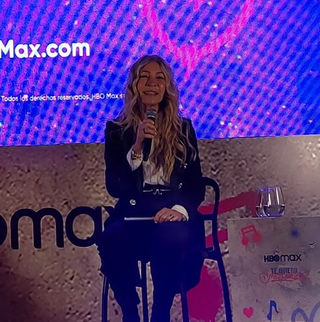Andrea del Boca is an Argentine actress and singer. She began her career as a child actress and subsequently became popular in the 1980s and 1990s for her roles in telenovelas, such as Estrellita mía, Celeste, Antonella and Perla negra. She has also appeared in numerous films and several theatre productions. Del Boca has won three Martín Fierro Awards.

Jorge Facundo Arana Tagle is an Argentine actor and musician. He is the winner of various awards for television and theater in Argentina. Arana is also noted for his charity work.

María Celeste Cid is an Argentine actress.

María Cristina De Giacomi, professionally known as Cris Morena, is an Argentine Award-winning television producer, actress, television presenter, composer, musician, songwriter, writer, former fashion model and CEO of Cris Morena Group.
Ana María Campoy was an Argentine actress of Colombian origin. She was born in Bogotá, the child of a couple of actors who had a theatre company in Spain. She began acting at the age of 4, and at 17 she formed her own company.

Olga Zubarry was an Argentine actress who appeared in film between 1943 and 1997. She made over 60 appearances in film, spanning six decades of Argentine cinema, but is best known for her work during the Golden Age of Argentine Cinema. Throughout the course of her career, she received four Silver Condor Awards, two Martín Fierro Awards, a Konex Foundation Award and several others for her films and television performances. She is credited with starring in the first film in Argentina which featured nudity, though only her back was shown and she stated repeatedly that she wore a flesh-colored mesh and was not truly nude.
Valentina Bassi is an Argentine film and television actress.

María Isabel Macedo is an Argentine actress and singer. She was the First Lady of Salta Province from September 24, 2016 until December 10, 2019.
Soledad Fandiño is an Argentine actress working primarily in television. She began her acting career by appearing in the television series Rebelde Way in 2003. In 2009, she transitioned to theatre, with a role in an adaptation of Alice in Wonderland.

María Rosa Gallo was an Argentine actress.

Patricia Castell, born Ovidia Amanda Paramidani Padín, was an Argentine actress, appearing on radio, television and in films. Born in Avellaneda in 1926, her career began in the 1940s and lasted for more than fifty years.

Graduados is a 2012 Argentine telenovela that was broadcast by Telefe from March 12 to December 19. The plot concerns a group of people who graduated from high school in 1989 and reunite twenty years later. The main character, Andrés Goddzer, discovers that María Laura Falsini was pregnant in 1989 and married Pablo Catáneo, who thought that he was the child's father. The resulting parental dispute, the love triangle of the main characters and 1980s nostalgia are frequent plot elements, and story arcs related to school bullying and LGBT rights are also featured. The frequent flashbacks of the characters to their high-school days use the same actors, playing teenagers.

Solamente vos is a 2013 Argentine Romantic comedy starring Adrián Suar and Natalia Oreiro, produced by Pol-ka that began to be aired on 21 January 2013, and ended 20 January 2014 from Monday to Thursday at 9:30 pm on the screen of Canal 13 as of 28 June, it also began airing on Fridays at 9:30 pm.

Farsantes is a 2013 Argentine legal drama. The main actors are Julio Chávez, Facundo Arana, Griselda Siciliani, Benjamín Vicuña and Alfredo Casero.

Mónica Villa is an Argentine actress of stage, screen, and TV, as well as a researcher and educator. She earned a Best Actress award for her role as "Susana" in cult classic "Esperando la Carroza at the 1985 Festival de Cine Iberoamericano, in Huelva, Spain. She won an ACE Golden award for best leading actress in the 2002 comedy "Ojos traidores", a 2004 Premios Trinidad Guevara for best Actress of a Repertoire Company, a Premios Carlos de Oro for her 2011 performance as best lead actress in the theater production "Jardín De Otoño", and in 2015 a Premios Estrella de Mar for Best Female Performance in a Repertoire Company for "La Nona". In addition, she has been nominated for a Best Actress in a TV Special for the 2003 Premios Martín Fierro, making her acting work recognized in all three major media.

Viudas e hijos del Rock and Roll is a 2014 Argentine telenovela, starred by Damián De Santo and Paola Barrientos. It includes several references to the Argentine Rock of the 1990s.
Raúl Jorge Tignanelli Mascaró, known as Raúl Taibo is an Argentine actor, whose work has been mainly in television. In 1973 he played a title role in Hipólito y Evita and in 2014 starred in Necrofobia. He is best known for his role as Lautaro Lamas in the 1990-1 telenovela Una voz en el teléfono.

Virginia Lago is an Argentine actress with an extensive career in theater, film, and television. She is best known for being the host of the popular film series Historias de corazón, broadcast by Telefe.
Marta Bianchi is an Argentine comic-dramatic actress of cinema, theater and television.
María Manuela Pérez Bosch Palos, better known as Manuela Pal, is an Argentine film, theater, and television actress.













